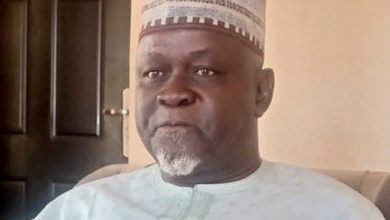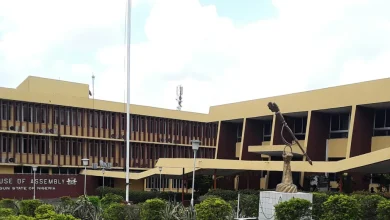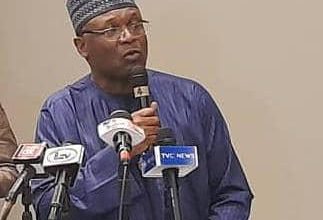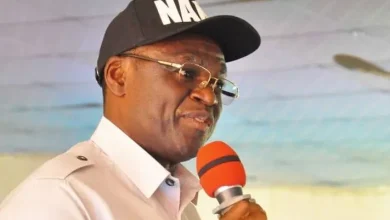
Politics
Popular political opposition chieftain, Abayomi Arabambi admits Governor Abiodun’s inclusive governance
A popular political opposition chieftain, Dr Abayomi Arabambi has admitted that Ogun State Governor Prince Dapo Abiodun has broken one of Nigeria’s most stubborn political taboos which he identified as separation of powers,stressing that the Governor has staged a quiet revolution b y allocating millions of naira to each legislator for constituency projects.
Penpushing reports that Arabambi made this known in a statement adding that members were asked to identify and recommend constituency projects within their respective constituencies for inclusion in the state’s approved project list and the execution of these projects is and – crucially – giving them the assembly members authority over implementation.
The politician stated that the mechanics of this transformation are worth examining, adding that each quarter, lawmakers submited project proposals based on extensive community consultations, noting that these undergo competitive bidding through the state tender board, with winning contractors required to provide regular progress reports to both the executive and legislature.

:The system creates what development experts call “triple accountability” – to the governor, to the assembly, and most importantly, to constituents. There exists an unwritten rule in Nigerian politics: governors govern, lawmakers legislate, and never the twain shall meet when it comes to development projects. For decades, this separation of powers has been more than just a constitutional principle – it has been a ironclad doctrine protecting executive prerogative until now’, Arabambi said.
“In Ogun State, Governor Dapo Abiodun has staged what can only be called a quiet revolution. By allocating millions of naira to each legislator for constituency projects. Members were asked to identify and recommend constituency projects within their respective constituencies for inclusion in the state’s approved project list and the execution of these projects is and – crucially – giving them the assembly members authority over implementation, he has broken one of Nigeria’s most stubborn political taboos. The results are challenging everything we thought we knew about governance in Nigeria’s states”, he emphasised.

“This is no theoretical exercise. Visit Aiyepe in Odogbolu and you’ll find Hon. Adeleye Lukman Olalekan inspecting the construction of new classroom blocks at the local high school. The project, selected by community leaders and supervised by the lawmaker’s office, represents more than just infrastructure – it embodies a radical new approach to representation. Before now, we would beg for years just to get a roof repaired. Now our assembly member works with us to identify needs and makes sure they’re met’, Arabambi quoted an headmaster of a school Adebayo Ogunlesi saying
“The mechanics of this transformation are worth examining. Each quarter, lawmakers submit project proposals based on extensive community consultations. These undergo competitive bidding through the state tender board, with winning contractors required to provide regular progress reports to both the executive and legislature. The system creates what development experts call “triple accountability” – to the governor, to the assembly, and most importantly, to constituents’, he wrote.
“The process is both simple and effective. Lawmakers consult extensively with their constituents to determine priority needs, whether it’s classrooms, health centers, boreholes, or market stalls. These projects are then subjected to a competitive bidding process supervised by the state’s tender board, ensuring transparency and value for money. Once approved, contractors are mobilized, and the lawmakers oversee implementation to ensure timely and quality delivery”, he added.

“This approach has multiple advantages. First, it ensures that development is demand-driven rather than imposed from above. Lawmakers, being closer to the people, understand the specific needs of their communities better than any centralized bureaucracy ever could. Second, it fosters accountability. Unlike in the past, where contractors might deliver substandard work with little consequence, lawmakers now have a direct stake in ensuring projects are well-executed, as their political futures depend on their performance”.
“The results are already visible. In Odogbolu, Hon. Adeleye Lukman Olalekan has secured the construction of classroom blocks in Aiyepe and Ibefun, addressing long-standing educational infrastructure gaps. In Abeokuta South, Hon. Igbalaye Wasiu Ayodele has prioritized boreholes and public toilets, tackling critical water and sanitation challenges’, he wrote.
“Same applies to Hon Amosun, Hon Sapele, Hon Segun Kaka , Hon Haruna and other members of the 10th Assembly who have all submitted the list of their preferred Constituency Projects to the state Government for approval. These are not random projects chosen from an office in Abeokuta; they are community-specific solutions identified by those who know these areas best”.
Penpushing further reports that Arabambi who recently started tagging himself as most non-confrotational political personality In Nigeria declared that what Governor Abiodun has done goes beyond just efficient project delivery, but has redefined the relationship between the executive and legislature in a way that could serve as a model for other states.

“Too often, governors treat state assemblies as rubber stamps or, worse, as adversaries to be subdued. This creates unnecessary friction, slows down governance, and ultimately harms the people. By contrast, Ogun State is experiencing a rare harmony between the two arms of government. Lawmakers no longer see themselves as powerless spectators but as active participants in governance. This sense of ownership has translated into a more collaborative atmosphere, where debates are constructive, and oversight is exercised in the public interest rather than as a tool for political vendettas”, he wrote.
“Perhaps the most striking aspect of this initiative is the level of trust it demonstrates. Governor Abiodun could have easily kept control of all projects, using them as patronage tools to reward loyalists and punish opponents. Instead, he has chosen to empower lawmakers across party lines, recognizing that development should not be politicized”,headded.
“This is not just good governance; it is smart politics. By giving lawmakers real responsibility, the governor has ensured that they share in both the credit for success and the burden of accountability. This reduces the temptation for unnecessary conflicts and creates a governance structure where everyone is invested in delivering results”.
“While the initiative is still in its early stages, the signs are promising. Projects are being delivered faster, communities are more engaged in governance, and the relationship between the executive and legislature is healthier than in most Nigerian states. However, challenges remain. Ensuring that the tender process remains transparent and free from manipulation will be crucial. Lawmakers must also resist the temptation to use these projects for personal gain, remembering that their primary responsibility is to their constituents”.
“If these hurdles can be overcome, Ogun State may well have found a formula for development that others can replicate. Governor Abiodun has shown that when leaders are willing to share power and trust institutions, the dividends can be immense. Governor Dapo Abiodun’s decision to empower lawmakers with constituency projects is more than just a policy innovation; it is a bold reimagining of how governance can work in Nigeria. By decentralizing development control, fostering collaboration, and prioritizing grassroots needs, he has set a new standard for inclusive governance”.

“As other states grapple with executive-legislative squabbles and stalled projects, Ogun is moving forward with a model that delivers both development and political harmony. History may well remember this as one of the most significant governance reforms in Nigeria’s Fourth Republic. For now, the people of Ogun State are the real winners—and that, ultimately, is what good governance is all about”,Arabambi emphasised
FOOTNOTE: You want to share story with us? You want to advertise with us? You need publicity for product, or service, or event? Contact us on WhatsApp +2348073463653 or email penpushing@yahoo.com






